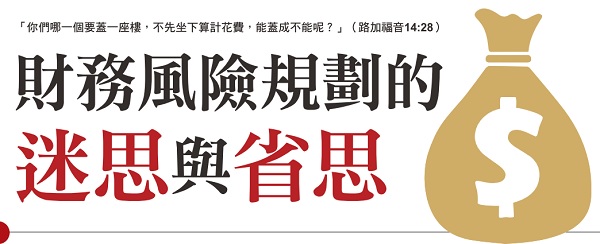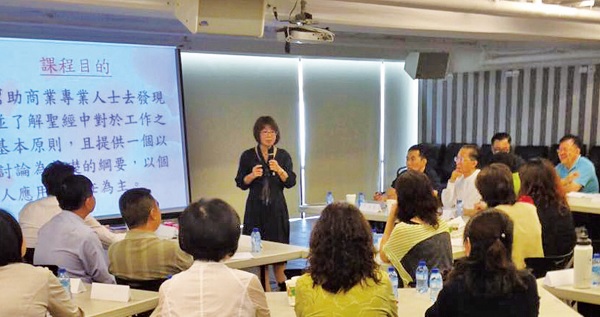Myths and Reflections on Financial Risk Planning
【Personal Finance Series】

In the humble article "Financial Risk Management Stop, Watch and Listen" in the 50th issue of "Kingdom of God" magazine, it is proposed that after understanding the reasons for the need for long-term financial planning and the importance of insurance planning, we must avoid life-threatening risks through correct insurance policy planning. risks and meet financial needs at different stages, so in the next few issues, in addition to analyzing sales methods and insurance myths in the Chinese insurance market, we will also analyze various types of insurance products to help you become your own insurance with a financial planner.

▲The author teaches in the church: teaching you to re-understand insurance products.
China's insurance industry originated from two insurance companies, Renhe and Jihe, founded in the 11th year of Guangxu's reign (1885) in the Qing Dynasty. They dealt with fire and marine insurance businesses (so China first had property insurance). The first self-operated life insurance industry established in Taiwan was Huaan Hequn Insurance Company, established in Shanghai in July 1911 (the first year of the Republic of China, the era of Japanese occupation). From 1961 onwards, when Taiwan’s National Government promoted the national economic construction plan, In view of social and economic development, there was an urgent need for insurance, so private insurance companies were opened. Since 1986, Taiwan's insurance market has been gradually opened to American companies.
However, for nearly a hundred years from 1918 to the end of 2017, Taiwanese people’s knowledge and concepts about insurance are still weak and lacking. In addition, most insurance companies and insurance practitioners in Taiwan are still oriented towards product sales and performance. Compared with European and American countries, which focus on risk management, financial planning and customer interests, there is a strong contrast.

▲The author is teaching a fellowship leader training course for the Global Christian Businessmen Association.
The most common problems in Chinese insurance experience
"I will give you whatever you ask for. I will give you an understanding and a discerning heart, such as no one before you has ever had, and no one will have again." (1 Kings 3:12)
1. Thinking that buying an insurance policy will cover everything and everything will be claimed;
2. Paying a lot of premiums every year, only to find out that there is no medical insurance plan at all when there is no claim for accident, illness, hospitalization or surgery;
3. Pay premiums every year but do not know or do not know the contents of the insurance you purchased;
4. People like to make short-term plans because they like to see the feeling of getting their money back. They get the entire money back in two, three, or six years and then plan again, resulting in lower and lower interest rates and thinner principals. ;
5. The annual premium paid exceeds one's ability, resulting in early termination of the contract, or all plans being wasted, or even serious loss of money;
6. Many customers are so angry that they have canceled all the policies in their family and claimed all the compensation. As a result, they have no protection when they get sick when they are old, or they are in the dilemma of being unable to buy any insurance again because of their old age or illness.
The above reasons lead to the phenomenon that Chinese people do not like insurance or even hate insurance, leading to a wrong understanding of insurance.
A summary of the current situation of insurance planning faced by Chinese people
“Do not forsake wisdom, and she will guard you; love her, and she will keep you.” (Proverbs 4:6)
1.stop selling effect
Many insurance companies and business personnel take advantage of the opportunity of insurance product suspension to inform customers in large numbers with sales tactics and words such as "I can only sell a few more policies or how much is the limit left, I reserve it especially for you", forcing them to Customers make quick purchase decisions in a very short period of time to achieve performance. At this time, in addition to insurance practitioners ignoring the real needs of customers, customers themselves also ignore their own needs.
2.Financial management seminars for banks or insurance companies
At present, investment and financial management lectures are the most commonly used marketing method. Through analysis by professional lecturers, newspaper and magazine briefings, gifts or various discounts, customers are attracted to buy on the spot. Group sales psychology is also used to achieve the purpose of selling insurance policies.
3.Purchase a policy through relationships, with a supportive, helpful or encouraging attitude
Most insurance practitioners sell insurance policies through personal connections and relationships rather than professionalism. Customers often buy insurance products because they are friends, relatives, juniors, etc.; and because of trust, they do not know much about insurance products before signing up for insurance. This will lead to a loss of trust in insurance business personnel in the future, deterioration of relationships, and huge misunderstandings about insurance.
4.Use interest rate incentives
Chinese people are accustomed to comparing interest rates or investment returns to decide whether to purchase insurance products. They ignore the real meaning and purpose of insurance, which is the transfer of risks and the liquidity of cash. This often results in temporary need for money but being unable to use it, or early termination of the contract resulting in losses. (The main meaning or purpose of insurance will be explained later.)
5.product-oriented sales
At present, banks and insurance companies still focus on product-oriented education and training for employees. They only talk about the benefits and benefits of the product itself, and employees only think about their own commissions, ignoring the help and benefits of products to different customers. Due to the degree of suitability, there are endless situations where transactions are concluded due to misunderstanding and early termination of contracts due to understanding.
6.Sales based on customer mentality
The Chinese lack the concept of long-term financial planning and lack of legal understanding of banks and insurance companies, resulting in a preference for short-term financial planning and insurance products. Insurance practitioners prefer to promote short-term products according to their preferences, rather than according to customers. Providing appropriate advice and planning for financial needs.
7.Threat policy sales
Many insurance practitioners use various media reports on accidents, disability, unfilial children, abandonment and other media reports to sell policies, instead of tailoring correct risk aversion and asset allocation for customers.
8.Insurance practitioners lack in-depth understanding of insurance products and professional capabilities in overall financial planning
At present, the education and training of most insurance companies every morning still focuses on the practice and promotion of insurance products, the sales of the insurance company's main products, using various insurance product incentives to increase performance and transaction volume, and even looking for part-time insurance jobs in large numbers. practitioners to develop high-performing business people. The company is oriented towards performance and turnover, rather than aiming to cultivate all-round financial planners who take the interests of customers as the starting point.
In fact, insurance brokers must always have a customer-focused mentality. Just like the principles mentioned in the Bible:
"No one seeks his own good, but the good of others." (1 Corinthians 10:24) "If you sell anything to your neighbor, or buy anything from your neighbor, do not deprive one another of anything." (Levi 1 Corinthians 10:24) (Unrecorded 25:14)

▲The author provides retirement planning courses for senior retirees in Evergreen.
The above current situation has long caused serious imbalances in the Chinese insurance market:
1.Most insurance policies are mainly savings insurance
Chinese people like to save money, like to compare interest rates, and are most afraid of wasting money. When they are deeply afraid of losing money, they don’t like to plan insurance products without a recovery mechanism. Therefore, their favorite thing to ask insurance salespeople is: "Can I get the money later?" "Come back?" Or: "When can I get the money back?" I feel that planning savings insurance makes me feel profitable, but medical insurance will be wasted if it is not used, so I invest almost all the money in savings products.
2.In recent years, short-term commodities have been booming
Since the financial turmoil in 2008, everyone has been insecure about future economic trends and prosperity. Therefore, they are less willing to make long-term plans. Insurance companies have also taken advantage of this and launched various short-term products to allow policyholders to purchase insurance in a short period of time. There is a feeling of getting the money back, which makes it impossible to accumulate wealth in the long term and compound interest cannot be rolled over in the long term. When the term is short and the interest rate is relatively low, and the interest rate is even lower when the policy expires and is re-insured, or when the lump sum is withdrawn, it is easy to spend it accidentally, resulting in a huge gap between the wealth at retirement and one's imagination. .
3.Policy cancellation rate is high
Due to the lack of overall planning and understanding of the product when planning the policy, people are often forced to sell, induced by interest rates, or insured because of favors. When they need to use money, they are shocked: if it is a savings product, it will basically have a lock-up period of several years. That is to say, if you need to use money in a short period of time or if you need to use money before the premium is paid, it will cause losses.
4.I have a bunch of policies but no medical insurance
Products such as term medical insurance, lifelong medical insurance, accident insurance, cancer insurance, and long-term care require more professional knowledge and good after-sales service. Therefore, there are not many insurance practitioners who are willing to devote themselves to learning to plan for customers. The company's education and training are mostly focused on investment and savings-related products. As a result, many customers, after paying premiums for many years, only discover that their policies do not have correct medical plans when they get sick or have an accident, causing huge financial losses to themselves and their families. Stress and burden.
5.What I bought is different from what I thought. There is a big gap.
The vast majority of customers have wrong expectations and understandings about the policies they plan. They think that as long as it is insurance, claims will be paid in any situation. For example, when planning savings insurance, they think that it will pay for hospitalization, and when planning medical insurance, they think that the money paid will be refunded after 20 years of payment. When purchasing accident insurance, I thought that compensation would be paid for general illnesses and hospitalizations. I planned to pay for a whole life insurance for 20 years, thinking that all other riders would be paid in 20 years, so I don’t have to pay anymore to have lifetime protection. I don’t know if this is actually necessary. You have to continue paying to be protected. This has resulted in many misunderstandings and even many claims disputes and lawsuits.
Customers need to understand insurance products
“If you are wise, it is to your advantage; but if you are scornful, you will bear the burden alone.” (Proverbs 9:12)
“Know the condition of your flock carefully, and take care of your cattle.” (Proverbs 27:23) (Know yourself and your enemy)
In order to avoid the recurrence of the above situation, as a customer, you must know yourself and your enemy. In addition to knowing your own needs, you must also take the responsibility of understanding insurance products, so as to avoid unnecessary misunderstandings and losses to your own finances and rights:
1. Don’t be forced to sell
Avoid being forced to make a decision in a short period of time due to interest rate cuts and sales suspensions; also avoid planning to give policy gift coupons, gifts, commission refunds, free afternoon tea, lunch, dinner, travel, etc., or purchase insurance products on-site. In addition, the currently popular telephone marketing requires attention to product content and service quality.
2. just do you best
Insurance policies are long-term financial plans (except for specially planned single-payment products). Please be sure to purchase insurance according to your ability to pay. Do not be forced to pay premiums that exceed your budget and ability. You should also pay attention to whether the liquidity of cash is suitable for you. needs to avoid monetary losses.
3. Learn about insurance products
Many insurance practitioners exaggerate the content of insurance products to achieve transaction purposes. Customers can search for information online, consult with several insurance sales personnel or professional financial planners, and learn more about various insurance products, such as life insurance and critical illness insurance. , medical insurance, surgery insurance, accident insurance, cancer insurance, redemption products, annuity-type property insurance products, property insurance, etc. (This part will be introduced in future articles.)
4. Avoid selling a single product and tailor your insurance plan
Insurance planning is based on the amount of your own responsibilities and the transfer of various risks. Therefore, avoid selling a single product. You should discuss with an insurance planner based on your age, status, income, responsibilities, short, medium and long-term financial goals, and As time passes, age increases, status changes, income and responsibilities increase or decrease, re-examine your insurance policies, financial planning, and even tax planning, so that you can truly take care of and commit to your love for your family and realize your life dreams.
Little reminder
Dear readers, how do you plan and purchase your insurance policy? Are there any of the situations mentioned above? If so, we recommend that you carefully refer to the articles in the next few issues and self-examine whether the insurance policies and financial plans you currently have meet your current and future needs. May you also be a good steward of the Kingdom of God.
 Pan Huating, CEO of Taiwan's Antai Insurance Brokers Company, holds international financial planner and psychological counselor certificates, and is a teacher at the Joshua School of Management of the Chinese Boaz Association. He loves life and devotes himself wholeheartedly to domestic and foreign gospel ministries, serving the disadvantaged in rural areas and poverty alleviation projects. He also participates in the ministries of entrepreneurs achieving kingdom enterprises and the Great Commission, and using his life to influence lives.
Pan Huating, CEO of Taiwan's Antai Insurance Brokers Company, holds international financial planner and psychological counselor certificates, and is a teacher at the Joshua School of Management of the Chinese Boaz Association. He loves life and devotes himself wholeheartedly to domestic and foreign gospel ministries, serving the disadvantaged in rural areas and poverty alleviation projects. He also participates in the ministries of entrepreneurs achieving kingdom enterprises and the Great Commission, and using his life to influence lives.
